
Hot topics don’t get much hotter than artificial intelligence, whether in headline news, or movies like Ex Machina, or Jimmy Fallon interviewing “Robot Sophia” on late-night TV, or in Thomas Gibbons’ fascinating, discussion-prompting, edge-of-your seat two-hander Uncanny Valley, now getting its Los Angeles Premiere at Long Beach’s International City Theatre.
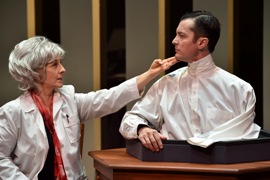 Set in “the not-distant future” (or about 2057 if my calculations are correct), Uncanny Valley introduces us to Claire (Susan Denaker), a 70ish neuroscientist who’s spent her lifetime creating “Neural Network Embodiment Prototypes” of increasing human verisimilitude, though at first glance all we see of her latest are armless shoulders, neck, and head protruding from a wooden hexagonal base, the mechanical, uninflected voice we hear coming from his lips sounding the furthest thing from human.
Set in “the not-distant future” (or about 2057 if my calculations are correct), Uncanny Valley introduces us to Claire (Susan Denaker), a 70ish neuroscientist who’s spent her lifetime creating “Neural Network Embodiment Prototypes” of increasing human verisimilitude, though at first glance all we see of her latest are armless shoulders, neck, and head protruding from a wooden hexagonal base, the mechanical, uninflected voice we hear coming from his lips sounding the furthest thing from human.
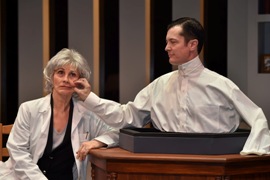 Little by little, however, over a series of short scenes punctuated during blackouts by sound designer Jeff Polunas’s striking musical underscoring, Julian (Jacob Sidney) takes shape before our eyes, gaining first one arm, then another, and then finally a torso and legs, the end result of which is an elegantly business-suited 30something whose voice, facial expressions, and body language could fool just about anyone into believing he’s flesh and blood, particularly since along with his built-in gift for mimicry, Julian has been programmed to think and feel so much like you and me, he just might overcome the “the phenomenon whereby a computer-generated figure or humanoid robot bearing a near-identical resemblance to a human being arouses a sense of unease or revulsion in the person viewing it,” i.e. the titular Uncanny Valley.
Little by little, however, over a series of short scenes punctuated during blackouts by sound designer Jeff Polunas’s striking musical underscoring, Julian (Jacob Sidney) takes shape before our eyes, gaining first one arm, then another, and then finally a torso and legs, the end result of which is an elegantly business-suited 30something whose voice, facial expressions, and body language could fool just about anyone into believing he’s flesh and blood, particularly since along with his built-in gift for mimicry, Julian has been programmed to think and feel so much like you and me, he just might overcome the “the phenomenon whereby a computer-generated figure or humanoid robot bearing a near-identical resemblance to a human being arouses a sense of unease or revulsion in the person viewing it,” i.e. the titular Uncanny Valley.
It is specifically to overcome this unease, this revulsion that Claire has devoted the past half-century of her life, creating prototype after prototype after prototype, the latest of which now stands before her, a next-thing-to-human being whom she has taught to understand the world around him, and that includes how to make small talk, recognize humor, play a vintage wooden flute, and even to dance.
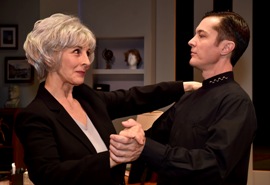 Along the way, Julian also learned a bit about Claire’s personal life, for instance that she and her scientist husband Howard have long been estranged from an adult daughter so repulsed by what her parents were “creating” that Mom and Dad have no idea if she’s married or if they have grandchildren or even if she’s even alive.
Along the way, Julian also learned a bit about Claire’s personal life, for instance that she and her scientist husband Howard have long been estranged from an adult daughter so repulsed by what her parents were “creating” that Mom and Dad have no idea if she’s married or if they have grandchildren or even if she’s even alive.
What we don’t learn, or at least not until halfway through, are the reasons why Claire’s “nonbiological human” has been given green eyes and black hair, the face of a thirty-four-year-old, and out of over five-thousand first names in common use in the United States, the name Julian.
Playwright Gibbons recommends Uncanny Valley be performed without an intermission, advice that director caryn desai wisely ignores, allowing the audience that quarter-hour for revelations to sink in and for possible consequences to be pondered once Claire and Julian have presumably said their final farewells.
If Act One has held its fair share of surprises and rewards, they pale next to those in store in Act Two, when questions of what makes a being truly human get raised in steadily more surprising ways leading up to Uncanny Valley’s unexpectedly powerful, and powerfully unexpected, climax.
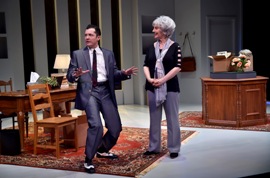 Under desai’s nuanced direction, the always outstanding Denaker starts off all business-and-starch before revealing the wounded wife and mother beneath, and a pitch-perfect Sidney first makes us believe his Julian not quite human, then has us wondering if maybe just perhaps he is.
Under desai’s nuanced direction, the always outstanding Denaker starts off all business-and-starch before revealing the wounded wife and mother beneath, and a pitch-perfect Sidney first makes us believe his Julian not quite human, then has us wondering if maybe just perhaps he is.
Scenic designer Tesshi Nakagawa’s white-walled office, offering a mix of timeless modernity and scientific sterility, has been lit with accustomed finesse by Donna Ruzika. Resident costume designer Kim DeShazo has given Claire and Julian some just-right outfits, and resident properties designer Patty and Gordon Briles have come up with some terrific knickknacks, first-prototype Eve’s head in particular, though a contemporary cell phone jars.
Uncanny Valley is produced by desai. Donna Parsons is stage manager and Sabrina Bordeaux is assistant stage manager. Casting is by resident casting director Michael Donovan and casting associate Richie Ferris.
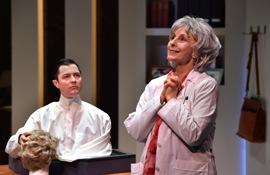 There’s nothing at all artificial about the intelligence (or the emotional resonance) of Uncanny Valley. I expect you’ll be talking about it long after Julian and Claire have left the room.
There’s nothing at all artificial about the intelligence (or the emotional resonance) of Uncanny Valley. I expect you’ll be talking about it long after Julian and Claire have left the room.
International City Theatre, Long Beach Performing Arts Center, 300 E. Ocean Blvd., Long Beach.
www.InternationalCityTheatre.org
–Steven Stanley
April 27, 2017
Photos: Steven Georges
Tags: International City Theatre, Los Angeles Theater Review, Thomas Gibbons



 Since 2007, Steven Stanley's StageSceneLA.com has spotlighted the best in Southern California theater via reviews, interviews, and its annual StageSceneLA Scenies.
Since 2007, Steven Stanley's StageSceneLA.com has spotlighted the best in Southern California theater via reviews, interviews, and its annual StageSceneLA Scenies.







 COPYRIGHT 2025 STEVEN STANLEY :: DESIGN BY
COPYRIGHT 2025 STEVEN STANLEY :: DESIGN BY